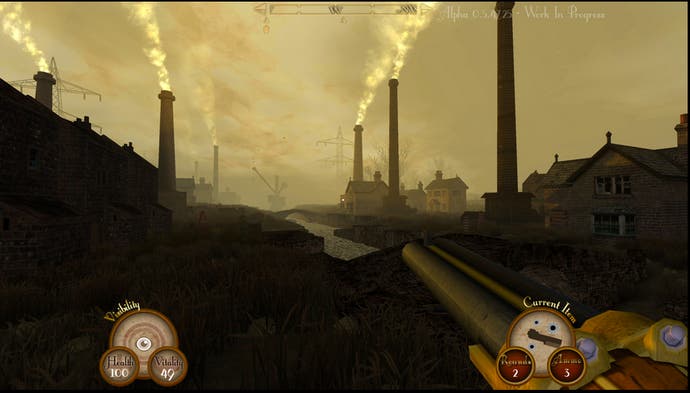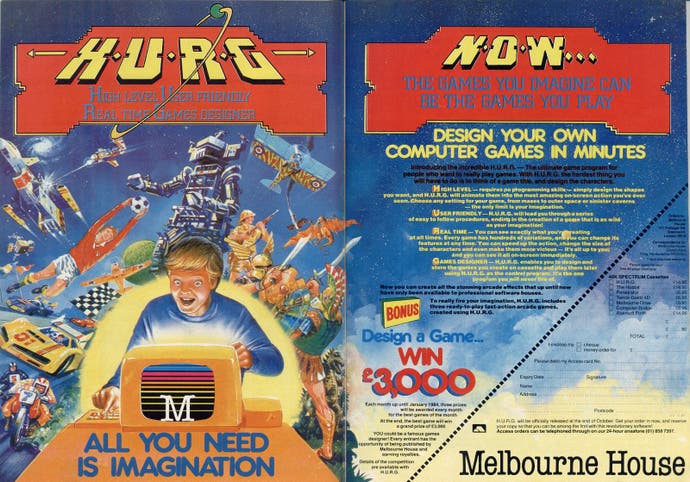Rob Fearon on: Three screens and the truth
"A replacement for the freedom music once offered."
Hello! Chris Donlan here. David Goldfarb, our regular columnist, is away this week, so I've asked Rob Fearon to write something instead and he has very kindly agreed. Rob designs wonderful arcade games such as DRM (which does not include DRM) and he is also a brilliant writer. I know: what a massive jerk. I really hope you enjoy what he's come up with today. Also, look at THIS.
I grew up in an all too typical 1980's northern town. Factories closed, unemployment rose. First friends of the family left jobless, then my parents. The stinking grey skies a reminder that the wheels of industry still turned close, the lack of food in the cupboard and the tears and upset a constant reminder of how out of reach most work in the area remained.
I got a Spectrum when I was younger, before the work and the money ran dry. I'd rush home from school to play Jetpac, Jet Set Willy, Jumping Jack and other games beginning with J. I loved playing games but I never felt like I could actually write the things. Sure, I'd tinker with The Quill to make hilarious (not actually hilarious) adventure games (for the kids that's what we'd now call "interactive fiction" or what a subset of idiots would call "not a game"), then there was HURG, GAC and SEUCK and other tools with awful acronyms designed to help make making games easier. In the main they were too limited or too difficult for me to use. Besides, I really liked playing games and making them seriously cuts into the time you can spend doing that, yeah?

By the time I was hitting school leaving age, it was becoming increasingly obvious that what was needed to make and sell a game would be out of reach for me anyway, the days of one person making good from their bedroom were already starting to feel distant.
It was also becoming increasingly obvious that my home town held little promise.
"Mum, I'm going to be a rockstar"
I'd read the stories in the music weeklies so many times, knew the names of the bands, went to gigs and saw the bands up there on the stage with the crowd cheering them on. I knew loads of people in bands because loads of people all had the same idea. You buy a guitar, a bass, some drums, a keyboard, whatever your instrument of choice. You join a band, you get successful and you get the hell out of town. That's how it worked. That's how it had to work. It's a story told a thousand times, the working class kids who made good. In the immortal words of Yosser Hughes, "Gizza job, I can do that".
If it all worked out, not only would I have the money to get the hell out of Dodge but just think of all the sex and all the drugs too. I was 16, sex and drugs sounded just great. To be fair, I'm much older now and well, you know.
My mum didn't bat an eyelid. She so very rarely did.
Four of us formed a band, five if you include the drummer who'd turn up occasionally. We got our photo in the local paper after figuring out that the local paper never had any news apart from "job losses at..." so we'd at least be something different for them to write about. We found a shonky attic above some shops and we rehearsed and we rehearsed. And by rehearsed I mean got incredibly drunk a lot and sometimes played some songs in-between getting drunk. One time our guitarist fell through the stairs and we laughed at that. We borrowed a video camera and made a music video. Sort of. We kinda just ended up miming all the parts and never gluing it together into a thing.

In retrospect, as escape plans go, we could have done with thinking it through a teeny bit more.
It never got us out of town.
I sat staring at a computer screen, twiddling my thumbs. Bored, unemployed, looking for something to do. I'd long ago left my home town behind in a less than rock and roll manner and now, here I was, gawping at the glow of a CRT, kinda without purpose.
"Hon, would you mind if I had a go at making games?"
"If you like", my partner muttered back.
There was just the one small problem, I couldn't really code. Nothing had really changed there from my old Spectrum days. I was still entirely clueless about how to actually make a game.
It turns out, that's not really that big a problem.
13 years on and I still don't really code in any traditional sense. For the entirety of my time in video games I've been using and advocating for accessible tools. I've watched these tools go from pilloried to grudgingly accepted to in widespread use. It's 2015 and I'm using Gamemaker to make games for Sony consoles. 13 years ago I'd have laughed at anyone who'd suggest that would be a thing. 13 years ago, everyone was laughing at me for thinking I could do anything or get anywhere with these tools.
Well. About that, right? The world changed.
It's been around ten years with indie games in the mainstream. From casual laying the groundwork for digital distribution proper to XBLA and Steam bringing it to the forefront, from the excitement of seeing journalists picking up on small projects from TIGSource and Indiegames front pages to Edge reviewing Noitu Love 2 alongside big releases, it's been quite the journey.

I cheered when our works made their eventual escape from the back pages of PC Zone and PC Gamer and galloped onwards to where we are now. Indie is a part of the video game landscape, Indie is everywhere and treated as every bit as vital as big box by corporations, by players and by developers and now we ask ourselves all the important questions like "what is indie?" and "are games art?" but at least we know games can really make us cry. I've played Duke Nukem Forever, I know.
I wanted this, I helped fight for this alongside so many who just wanted to be heard, to be given a shot at showing what we could make.
The rise of indie goes side by side with the rise of the accessible game making tool.
Video games are, in effect, the new rock and roll.
They're not the new rock and roll in the sense that you'll find an indie celebrity huffing cocaine off the butt-crack of a 17-year-old groupie (although never say never, I guess), they're not the new rock and roll because Jon Blow is the new Led Zeppelin (although never say never, I guess) or I don't know, whatever tenuous comparison you want to try and draw. Jeff Minter is Pink Floyd in...
Video games, they're a replacement for the freedom music once offered.
Where once musical movement after movement offered some hope of escape out of the dullness of the everyday, from rock to soul to punk to synth to dance to Britpop and... well, I'm sure there was something after Britpop exhausted us all anyway, that's all lost to the X-Factor and The Voice and dance for the rich men and women of the panel and for the audience at home and don't forget to vote for your favourite now. God-dammit, where's the pliers?
Where I bought a guitar all those years ago, the kids now would download Unity, Gamemaker, Construct or Twine.
The kids see the stories on websites, in magazines and on YouTube and Twitch, they've watched Indie Game: The Movie, they've strolled up to expos and seen their game-makers speak. They know loads of people making video games because loads of people all had the same idea. You download Gamemaker, you download Unity, Construct, whatever your weapon of choice. You make a video game, you get successful and you get the hell out of town. That's how it works. That's how it has to work. It's a story told a thousand times, the kid who made a game and made good.
We all know, really, that it won't be an easy ride for them, that most video games simply don't make money or find their audience but hey, when I stood in that attic and took my turn on the mic I knew most bands didn't make money either. It didn't stop me enjoying the moment. It didn't stop me trying and that's it isn't it? You've got to try, man.
It's all about hope.
Besides, it's 2015 and the kids need all the chances they can get, y'know? If that chance, just one of those chances, can come through video games then well, isn't that sort of brilliant? Three chords and the truth becomes three screens and I dunno, probably a really deep and meaningful message, man. Or lasers. There's always lasers. If they're lasers attached to fish, that's even better. The best even.
Here's to the new rock and roll, to video games and to the kids.
The future's so bright, I gotta wear Rifts.

